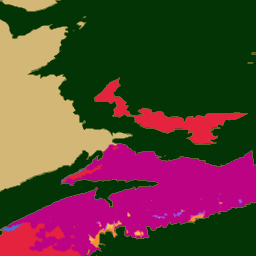Page Summary
-
The Global Ecosystem Typology is a global classification system for ecosystems based on their unique characteristics, providing a consistent framework.
-
This dataset focuses on the third level of the typology, the Ecosystem Functional Group, which are groups of related ecosystems within a biome sharing common ecological drivers.
-
The dataset was simplified to reduce geometry complexity, resulting in the removal of approximately two dozen rows with zero area.
-
The dataset includes table schema information for
efg_code,map_code,map_version, andoccurrence. -
This dataset is available under the CC BY 4.0 license and requires appropriate crediting when re-used.

- Dataset Availability
- 2023-09-14T00:00:00Z–2023-09-14T00:00:00Z
- Dataset Provider
- International Union for Conservation of Nature and Natural Resources
- Tags
Description
The Global Ecosystem Typology is a taxonomy of ecosystems based on their unique characteristics. It is a global classification system that provides a consistent framework for describing and classifying ecological ecosystems.
The Global Ecosystem Typology has six levels. The top three levels (realms, functional biomes, and ecosystem functional groups) classify ecosystems based on their overall characteristics, such as their location, dominant plant life, and ecological processes. The bottom three levels (regional ecosystem subgroups, global ecosystem types, and subglobal ecosystem types) focus on specific geographic variants within ecosystem functional groups and complexes of organisms and their associated physical environment, providing a more detailed understanding of particular ecosystems.
This dataset focuses on the third level of the Global Ecosystem Typology: Ecosystem Functional Group. It's defined as a group of related ecosystems within a biome that share common ecological drivers, which in turn promote similar biotic traits that characterise the group. Derived from the top-down by subdivision of biomes.
NOTE: Due to the size of some geometries, a simpification algorithm was applied to each one to reduce their complexity. As many vertices as possible were discarded without moving the distance from the original shape more than 100 m. As a result, approximately two dozen rows in the table collapsed into geometries with 0 area and were removed.
Table Schema
Table Schema
| Name | Type | Description |
|---|---|---|
| efg_code | STRING | Ecosystem functional group code (e.g., "T1.1" = Tropical/Subtropical lowland rainforests). For a complete taxonomy, see https://global-ecosystems.org/explore. |
| map_code | STRING | Map code |
| map_version | STRING | Map version |
| occurrence | INT | It indicates whether the specified region contains major occurrences (1) or minor occurrences (2) of the functional group." |
Terms of Use
Terms of Use
Global Ecosystem Typology datasets are provided under the CC BY 4.0 license, which allows re-distribution and re-use of a licensed work on the condition that the creator is appropriately credited.
Citations
RT Pennington, J Franklin, NA Brummitt, A Etter, KR Young, RT Corlett and DA Keith. (2022). T1.2 Tropical/Subtropical dry forests and thickets. In: Keith, D.A., Ferrer-Paris, J.R., Nicholson, E. et al. (2022). A function-based typology for Earth's ecosystems - Appendix S4. The IUCN Global Ecosystem Typology v2.1: Descriptive profiles for Biomes and Ecosystem Functional Groups.
DOIs
Explore with Earth Engine
Code Editor (JavaScript)
var ecosystemTypology = ee.FeatureCollection('IUCN/GlobalEcosystemTypology/current'); var propertyToFilter = 'efg_code'; var labelsAndColorsClient = { 'F1.1': '7e3fe6', 'F1.2': '77b3fd', 'F1.3': '7b8347', 'F1.4': 'fa6811', 'F1.5': '965e6e', 'F1.6': 'd595dc', 'F1.7': '2f14df', 'F2.1': '224730', 'F2.10': '2f6323', 'F2.2': 'ea36a3', 'F2.3': 'b2fc44', 'F2.4': 'c2318a', 'F2.5': '6f243e', 'F2.6': 'ad10a8', 'F2.7': '6a4210', 'F2.8': '839347', 'F2.9': '118b94', 'F3.1': 'cb3855', 'F3.2': 'd2b776', 'F3.3': 'ff72ed', 'F3.4': '377e85', 'F3.5': '3fa71f', 'FM1.1': '10e167', 'FM1.2': '4e6fca', 'FM1.3': '858536', 'M1.1': '141076', 'M1.10': 'a6067b', 'M1.2': '663dbc', 'M1.3': '850c23', 'M1.4': 'aa2923', 'M1.5': '937e3c', 'M1.6': 'f1ecae', 'M1.7': 'ba931f', 'M1.8': '023405', 'M1.9': 'ed5a09', 'M2.1': '354a2a', 'M2.2': '8239cf', 'M2.3': '73b3cc', 'M2.4': 'be48b2', 'M2.5': 'c4897c', 'M3.1': '68a571', 'M3.2': '69197d', 'M3.3': 'e22319', 'M3.4': '40b73a', 'M3.5': 'caf10c', 'M3.6': '762197', 'M3.7': '91b06a', 'M4.1': '91c173', 'M4.2': 'e1ea4a', 'MFT1.1': '9a1e2d', 'MFT1.2': '22aeda', 'MFT1.3': 'f0ae6e', 'MT1.1': '1b96de', 'MT1.2': 'ea9e91', 'MT1.3': '0c9494', 'MT1.4': '436836', 'MT2.1': '3478ff', 'MT2.2': 'e6233f', 'MT3.1': '0936c9', 'S1.1': '9d7488', 'S2.1': 'ea1bee', 'SF1.1': '231e5f', 'SF1.2': 'f4cc74', 'SF2.1': 'fb0986', 'SF2.2': 'fb9bce', 'SM1.1': '0d3303', 'SM1.2': '9964a5', 'SM1.3': 'f88d38', 'T1.1': '048045', 'T1.2': 'ac86c0', 'T1.4': '0e19a9', 'T2.1': 'bc0383', 'T2.2': '965eed', 'T2.3': '7d951f', 'T2.4': 'd98c15', 'T2.5': 'f1abff', 'T2.6': 'be7214', 'T3.1': 'b03750', 'T3.2': 'e74d19', 'T3.3': '696ec3', 'T3.4': 'fbb043', 'T4.1': '5b06be', 'T4.2': '583d4f', 'T4.3': 'edfc30', 'T4.4': 'f32748', 'T4.5': '363f08', 'T5.1': 'e6891c', 'T5.2': '032bc5', 'T5.3': '8daed3', 'T5.4': 'b359cb', 'T5.5': '8b5536', 'T6.1': '3d8857', 'T6.2': 'e87587', 'T6.3': '8336b8', 'T6.4': 'fa8a1b', 'T6.5': '7427f1', 'T7.1': '7d29a9', 'T7.2': '566e14', 'T7.3': 'f4bf4a', 'T7.4': 'fc2a94', 'T7.5': '0e6040', 'TF1.1': 'e0b4cc', 'TF1.2': '5aabbc', 'TF1.3': '63f039', 'TF1.4': 'ec6bdb', 'TF1.5': 'f786ec', 'TF1.6': '00b9f4', 'TF1.7': '77d71d', 'T1.3': 'ffffff' }; var labelsAndColors = ee.Dictionary(labelsAndColorsClient); var filteredEcosystems = ecosystemTypology.filter(ee.Filter.neq(propertyToFilter, null)); var image = filteredEcosystems .map(function (feature) { return feature.set('efgStyle', { 'color': labelsAndColors.get(feature.get('efg_code')), }); }) .style({ 'styleProperty': 'efgStyle', }); Map.addLayer(image, {}, 'Global Ecosystem Typlology'); Map.setCenter(-63.873, 46.194,8);